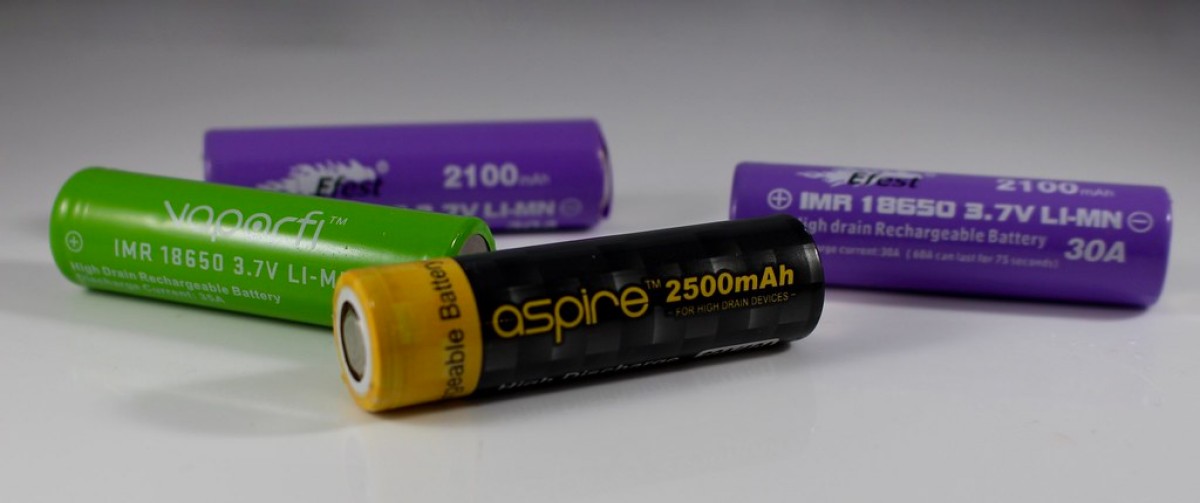How Long Do 18650 Batteries Last?

There’s no denying that consumers have a vast amount of choice when it comes to powering portable devices like vape pens, power tools, and electronic devices.
According to research, demand for today’s batteries continues to grow, as does demand for battery-powered consumer goods, and the market is worth approximately $108.4 billion.[1]
One of the most popular battery types on the market is the 18650 battery. Products like EcoGear FX’s best 18650 button-top rechargeable batteries are ideal for numerous applications ranging from flashlights and vape pens to video doorbells and camping lanterns.
How long do 18650 batteries last? To answer that question, it first makes sense to look at the factors that influence their lifespan, along with steps you can take to extend charging cycles and the best ways to store them when they don’t get used for a long time.
 5 Factors That Influence 18650 Battery Life
5 Factors That Influence 18650 Battery Life
No one can definitively answer a question like “how long do 18650 batteries last” because several things can alter the life expectancy of fully-charged 18650 batteries. But, which factors can influence how long they last before they need recharging or replacing?
The following five factors will give you a detailed insight into whether a 18650 battery can last a long time or drain very quickly:
1. Age
Firstly, it makes sense to consider the age of 18650 batteries. As you probably know, batteries only provide power for a limited time before they need recharging. Plus, the performance of batteries degrades with each recharge cycle.
But, what you may not know is that the age of a button top or flat top IMR vape 18650 battery can affect how well it performs. If you have unused 18650 batteries that are several years old, did you know they can lose up to 20% of their charging capacity each year?[2]
In theory, a brand new 18650 battery could be completely unusable in five years, rendering it useful only for recycling. Therefore, if you buy brand new 18650 batteries, it’s a good idea to use them soon after purchase.
2. Capacity
Another influential factor to consider when looking at what affects a 18650 battery’s life is its capacity. The universal way to measure energy in all batteries, irrespective of their type, is with Ah (amp hours), mAh (milliamp hours), and Wh (watt hours).
When looking at capacity specifically in 18650 batteries, you will usually find they get measured in mAh. With all that in mind, how does a 18650 battery’s capacity determine how well it will perform throughout its life?
Battery capacity naturally decreases with its age, whether you use a battery regularly or not. 18650 batteries with a high initial capacity will provide more energy before needing to get recharged.
As a result, high capacity examples won’t diminish as quickly as lower capacity ones due to infrequent charging cycles.
3. Quality
As you might expect, high-quality 18650 batteries will last longer than inferior examples. That’s because batteries that get made with robust components and are well-constructed will provide high performance for their intended applications.
If you use cheap, no-name 18650 batteries and high-quality, branded examples for identical applications, you will always notice the branded ones will outlast the cheaper ones.
There’s also the safety aspect to consider. Poorly-made 18650 batteries can easily explode, resulting in damage to consumer electronics, a severe threat to human life, and, of course, a fire risk.
4. Charging Cycles
Even the best 18650 batteries on the market will eventually run out of power and need recharging. Any rechargeable battery will experience degraded performance over time with each recharge cycle, whether it’s a 18650 battery or the 12v battery fitted to your car.
The good news is there are some tips and tricks you can follow to extend the charging cycles for your 18650 batteries – more on that later on this page.
5. Storage
Last but not least, storage is an influential factor that can impact the lifespan of 18650 batteries. If you buy new 18650 batteries and don’t start using them for more than a year, they will have significantly less capacity than when you first bought them.
Where and how you store your batteries is also important. 18650 batteries work best when stored at low temperatures; anything higher than around 120° F will seriously degrade the batteries.
How Long Do 18650 Batteries Stay Charged?

The following steps will help you to extend the useable life of your 18650 batteries:
How to Extend 18650 Battery Charge Cycles
Lithium batteries like the 18650 batteries offer a prolonged lifespan if they don’t get charged to 100% capacity.
Many battery experts recommend charging 18650 batteries to 80% of their maximum discharge capacity. Doing so enables you to slow down battery capacity reduction and increase the number of charge cycles.
If possible, charge your 18650 batteries at a lower amp rating than recommended (also known as “trickle charging”). The trade-off with quicker charging times is lower overall performance, meaning you’ll need new 18650 batteries sooner rather than later.
How to Store 18650 Batteries
You already know that storing unused batteries at low temperatures helps to prolong their lives. With that in mind, ensure your battery storage location is away from direct sunlight and extreme heat sources.
If you seldom use your 18650 batteries, removing them from your tools or devices and storing them elsewhere also makes sense. That’s because they won’t get subject to any parasitic drains.
Conclusion
18650 batteries are undeniably useful for various consumer, commercial, and industrial applications. They get used in tools, consumer electronics, and even as part of electric vehicle battery packs.
Choosing the right ones for your needs and taking appropriate steps to care for them will result in increased performance for longer.
[1] https://www.grandviewresearch.com/industry-analysis/battery-market
[2] https://www.popularmechanics.com/technology/gadgets/how-to/a7432/why-your-gadgets-batteries-degrade-over-time-6705747/




